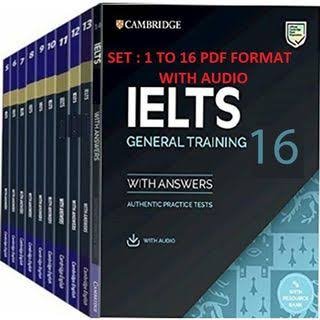Table of Contents
Here is a Review and free ebook in PDF format download Complete Cambridge IELTS 1-16. It is not difficult to comment on the quality of this Complete Cambridge IELTS 1-16 with audio because it is already well-known. It’s a waste of money if you don’t know about the Cambridge IELTS book series or don’t have any books to read!

download_free_pdf_complete_cambridge_IELTS
Check out more:
(Ebook Review) Download the full set of Hackers IELTS basic Free PDF Listening + Reading
(Ebook Review) Download Cambridge IELTS Intensive Training Writing PDF for free
Main content:
- Information about Cambridge IELTS books 1-16
- Review of Cambridge IELTS books 1-16
- What is the Cambridge IELTS study method?
- Download Complete Cambridge IELTS 1-16
- Information about Cambridge IELTS books 1-16
Information about Cambridge IELTS books 1-16 (Ebook Free PDF)
- Book title : Cambridge IELTS
- Publisher : Cambridge University
- Suitable books: from band 3.5 IELTS and above
- Number of books: 16 books
- Book content : In each Cambridge IELTS book, there will be 4 actual tests, helping learners to understand the latest trends in IELTS questions each year.
- Advantages: The book is updated each year to reflect the current exam format, allowing students to understand the overview of the question format and prepare for the upcoming exam.
- Cons: This book is only for those of you who already have a solid foundation of English, a good level, and need to start reviewing IELTS, or for those of you who have lost your roots and want to learn IELTS. Please review grammar and vocabulary before practicing.
The Cambridge IELTS book series 1-16 is intended to provide an overview:
- 4 basic tests with varying degrees of difficulty based on the year’s new issue trend. The most recent topic is the Cambridge IELTS 15.
- The tests all have answers and audioscripts so that you can double-check your answers.
- Prepares some speaking and writing exercises for you to use.
- There are enough pdf + audio files for you to listen to and complete the test.
The Cambridge IELTS set from 1 to 15 in particular is the best source of IELTS mock tests for you to familiarize yourself with the IELTS test structure as well as practice IELTS knowledge before entering the actual exam. It is advised that Students need to study from the Cambridge IELTS 7-15 book as it will be more appropriate for today’s IELTS exam module.
This is the best source of practice test questions for you if you want to familiarize yourself with the structure of the IELTS test and practice problem solving before taking the actual test.
Do you really understand how to use these 15 books before downloading the book by clicking the link at the end of the article? The following is a review of tips and methods to help you fully utilize Cambridge IELTS and achieve a really high score on the exam:
Cambridge IELTS books 1-16 review:
The Cambridge IELTS book and ebook pdf series is the best set of materials for some IELTS preparation students. This is a collection of books based on the real IELTS test structure that will help you practice as realistically and confidently as possible before taking the real IELTS exam.
Previously, Cambridge IELTS only published a few sets of six Cambridge IELTS books known as “specialties”: Cambridge IELTS 1, Cambridge IELTS 2, Cambridge IELTS 3…, Cambridge IELTS 6, but they have since released 9 more books. There are a total of 15 books.
Recently, the market has been dominated by four books: Cambridge IELTS 10, Cambridge IELTS 11, Cambridge IELTS 12, Cambridge IELTS 13, while cambridge IELTS 14, Cambridge IELTS 15 (Cambridge IELTS 15 is super hot being the most recently released), as a result of the exam structure’s closeness and the constant updating over a number of years. As a result, you will need to start practicing exam questions from the most recent book. Then work on some older books, and if you have enough time, try to master the entire series. To make it more complete, we divide it as follows:
- Cambridge IELTS 1-6: Question types, some topics under Writing, and test formats from 1998 are likely to be out of date today. We will only practice when we have free time.
- Cambridge IELTS 7-10: Until now, we have been unable to fully capitalize on some of the benefits that the book series provides to students.
The publisher has revised and refreshed the question types, exam format, and some topics under the Writing and Speaking tests.
Cambridge IELTS 7-10 provides a number of specific Writing solutions, as well as additional examiner comments based on the exam’s marking objectives.
- There is no reason why you should pass Cambridge IELTS 11-16. Because it is visited as a bedside book by some IELTS candidates and used as a source of practice. This book series has the following features:
The comparison of the two methods: Academic and General Training have been separated into different formats and are no longer found in the same book. Reduce the “bulkyness” of the book, allowing you to focus on learning the chosen method in a more convenient manner.
The format of the exam questions has changed significantly in recent years, reflecting the trend of the real test. Typically, in the Listening test, the phrase “Write NO MORE THAN TWO WORDS” no longer appears in the form of a word-filling question; instead, in some types of word-filling exercises, it will be “Write ONE WORD ONLY.” Not as perplexing for test takers as some of the previous year’s books.
The book is organized in order of increasing difficulty, so while the first two Tests may be very easy, the second two Tests may be more difficult. This method of creating questions allows learners to become acquainted with any level of the test, from easy to difficult. Practice and strengthen skills.
What is the Cambridge IELTS study method?
To get the most out of the series, you should do the following:
- Set a timer to begin and end each test.
- Take the test as quickly as possible, and consider it a real test.
- Please return to the answers at the end of the book and mark the points where you are incorrect or do not understand, so that you can ask your teacher or friends to assist you in answering them.
Self-study IELTS provides the following tips for each test section:
IELTS Listening section
One of the most significant limitations of the IELTS exam is that you can only listen once. You will not be given a second chance if you miss parts of the lesson.
When we practice listening at home, however, you can completely divide the listening lesson and listen to it over and over. Every time you listen, you will undoubtedly learn something new, and your listening skills will vastly improve over if you only listened to the tape once.
Tips for Listening: (improve your vocabulary link)
Repeat listening to the same tape, focusing on a different element each time.
For example, gather for the first listening to listen to and comprehend the meaning of the entire song or grasp the main idea of the lesson.
On the second listening, you can gather to hear some of the lesson’s verbs and see how they are conjugated.
Next, try listening to the speaker’s pronunciation, stress, or intonation, and finally, try listening to some words such as articles or prepositions….
After repeating this secret of deep listening, your earing will gradually improve.
There has been a significant change in the format of the Listening 2020 section, which you should be aware of:
- The word “section” was replaced with “part.”
- For example, there will be no more reading, but you will still have time to read the question. (You will overhear a conversation….) First, take some time to consider questions 1–4.)
- There is no longer a prompt for page numbers.
You should go to the link above and take the 2020 format test to get used to it, and don’t forget to practice listening in the Cambridge IELTS book to increase your sensitivity when taking the test.
IELTS Reading Section
In this section, you should practice doing it several times. This will help you score some grammar points, vocabulary, and mistakes to avoid in order to perform better.
If you have already completed some of the Reading tests (Reading) in the Cambridge IELTS series, please do so again.
- To begin, you should take the test in under 60 minutes to see how many points you receive.
- Next, do the test again, but this time do not limit the time that you always do the test according to your ability.
- Only do one passage under 20 minutes.
- Try gathering only one type of question, for example: true, false, not given.
- Take the test and use the dictionary at the same time to see if you can improve your score.
- Or you can try reading an article to see if you understand or not. Don’t answer some questions.
- Alternatively, you can preview the answers and try again under the tour reading where they appear.
- Finally, you should make a vocabulary table and some “keywords” under the lesson
IELTS Writing Section
In this section you need to practice as follows: Try writing with 5 different articles in response to a given question. It should be noted that the level and difficulty of each lesson must be increased.
When practicing writing(Writing), When practicing writing , instead of attempting 4 different Writing problems, try writing 1 topic but writing it 4 different times.
Each time you write, you try to improve and develop an angle of the article.
For example:
- On the first write, you might try focusing on the grammar of the article, trying to use variety and some complex structure under the article.
- For the second writing, you can further develop your ideas, especially the explanations and examples.
- In the next few times, why don’t we try more expressions and upgrade the vocabulary of the article?
When you use this method, your writing skills will almost certainly improve surprisingly!
To begin, write a few short sentences that express the problem in the most concise way possible. Next, try expanding the sentence using the grammar structures you’ve learned. The article can then be expanded further, focusing particularly on the evidence and explanation.
Speaking section of the IELTS:
You should read the Cambridge IELTS book for some Speaking topics.
- Make several different question lists.
- Remember to do them every day and practice them every day.
- Record your friends’ speeches so that you can listen to them again, check for errors, and make notes for future improvement. Before the exam, you should be able to “master” this list of questions.
- All of the methods listed above follow the same pattern of repetition, which guarantees that you will be bored at some point in time. There is, however, no shortcut to success!
Free Download Link Complete Cambridge IELTS 1-16 Ebook in PDF format and Audio Listening section:
- Cambridge IELTS 1
- Cambridge IELTS 2
- Cambridge IELTS 3
- Cambridge IELTS 4
- Cambridge IELTS 5
- Cambridge IELTS 6
- Cambridge IELTS 7
- Cambridge IELTS 8
- Cambridge IELTS 9
- Cambridge IELTS 10
- Cambridge IELTS 11
- Cambridge IELTS 12
- Cambridge IELTS 13
- Cambridge IELTS 14
- Cambridge IELTS 15
- Cambridge IELTS 16
To extract this PDF zip file use this Password: 0313118899

